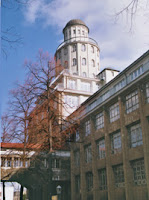 |
| http://bit.ly/13HuB4k |
Die rund 70 Teilnehmer zu denen auch die interessierte Öffentlichkeit zählte (kurz vor Beginn der Tagung wartete rund ein Dutzend nicht angemeldeter Besucher auf die Möglichkeit des Einlasses) konnten den Charme des museumseigenen Kinosaals erspüren. Man konnte erahnen, dass so manches Industriegebäude nur noch auf die wachküssende Muse wartet - oder auch Macher wartet.
Einige Highlights des Tages seien an dieser Stelle besonders erwähnt:
Der oberste Denkmalschützer der Landeshauptstadt Dresden, Dr. Bernhard Sterra, erläuterte eingangs, wie aus seiner Sicht künftiges Zusammenwirken von Eigentümer, Denkmalbehörden und potentiellen Nutzern erfolgreich den Erhalt und künftige Nutzung ermöglicht. Dass dies in Dresden bereits erfolgreich gelungen ist im Falle eines stillgelegten und ursprünglich außerhalb der Sanierungsgrenzen liegenden Volksbad im Stadtteil Löbtau lässt sich am neuen Theaterkindergarten FunkeldunkelLichtgedicht ablesen.
Dr. Matthias Baxmann, Fachreferent Praktische Denkmalpflege im Brandenburgischen Landesamt für Denkmalpflege und Archäologisches Landesmuseum, regte mit seinem aus dem Publikum kommenden Kommentar über die Speicher in Wittenberge und die Rolle von Facebook und Twitter sowie den entstandenen "Shitstorm"an, auch über die Nutzung neuer Medien im Bereich Denkmalpflege nachzudenken und diese entsprechend zu nutzen. Inzwischen ist vom ursprünglich beabsichtigten Abriss der drei Getreidespeicher am Hafen Wittenberge nicht mehr die Rede und eine Sicherung in Aussicht.
 |
| http://tapetenwerk.de/ |
Alles in allem eine gelungene Veranstaltung im Rahmen der Ausstellung "INDUSTRIEARCHITEKTUR IN SACHSEN", die vom 07. Oktober 2012 - 24. Februar 2013 in den Technischen Sammlungen Dresden zu sehen war.
Ein persönliches Fazit wie stets von einer Tagung in vier kurzen Fragen bzw. Antworten:
Gut - Inspirierender Ort mit Geschichte, Vorträge mit praktischer Relevanz
Tricky - (noch) fehlendes WLAN und Stromversorgung, ein Tag kaum ausreichend für das Thema
Learned - Speicherrettung in Wittenberge, Einsatz von Twitter/ Facebook für Rettung von Denkmalen
Action - Mehr über Industriekultur-In-Sachsen erfahren